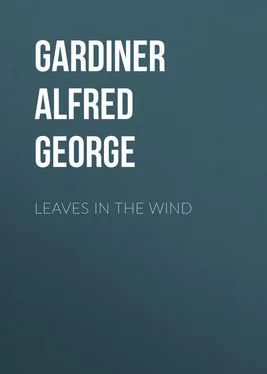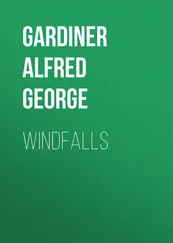Alfred Gardiner - Leaves in the Wind
Здесь есть возможность читать онлайн «Alfred Gardiner - Leaves in the Wind» — ознакомительный отрывок электронной книги совершенно бесплатно, а после прочтения отрывка купить полную версию. В некоторых случаях можно слушать аудио, скачать через торрент в формате fb2 и присутствует краткое содержание. Жанр: История, foreign_antique, foreign_prose, на английском языке. Описание произведения, (предисловие) а так же отзывы посетителей доступны на портале библиотеки ЛибКат.
- Название:Leaves in the Wind
- Автор:
- Жанр:
- Год:неизвестен
- ISBN:нет данных
- Рейтинг книги:5 / 5. Голосов: 1
-
Избранное:Добавить в избранное
- Отзывы:
-
Ваша оценка:
- 100
- 1
- 2
- 3
- 4
- 5
Leaves in the Wind: краткое содержание, описание и аннотация
Предлагаем к чтению аннотацию, описание, краткое содержание или предисловие (зависит от того, что написал сам автор книги «Leaves in the Wind»). Если вы не нашли необходимую информацию о книге — напишите в комментариях, мы постараемся отыскать её.
Leaves in the Wind — читать онлайн ознакомительный отрывок
Ниже представлен текст книги, разбитый по страницам. Система сохранения места последней прочитанной страницы, позволяет с удобством читать онлайн бесплатно книгу «Leaves in the Wind», без необходимости каждый раз заново искать на чём Вы остановились. Поставьте закладку, и сможете в любой момент перейти на страницу, на которой закончили чтение.
Интервал:
Закладка:
I recall one among many of these occasions for my chastening. When I was young I was being driven one day through a woodland country by an old fellow who kept an inn and let out a pony and chaise for hire. As we went along I made some remark about a tree by the wayside and he spoke of it as a poplar. "Not a poplar," said I with the easy assurance of youth, and I described to him for his information the characters of what I conceived to be the poplar. "Ah," he said "you are thinking of the Lombardy poplar. That tree is the Egyptian poplar." And then he went on to tell me of a score of other poplars – their appearance, their habits, and their origins – quite kindly and without any knowledge of the withering blight that had fallen upon my cocksure ignorance. I found that he had spent his life in tree culture and had been forester to a Scotch duke. And I had explained to him what a poplar was like! But I think he did me good, and I often recall him to mind when I feel disposed to give other people information that they possibly do not need.
And the books I haven't read, and the sciences I don't know, and the languages I don't speak, and the things I can't do – young man, if you knew all this you would be amazed. But it does not make me unhappy. On the contrary I find myself growing cheerful in the contemplation of these vast undeveloped estates. I feel like a fellow who has inherited a continent and, so far, has only had time to cultivate a tiny corner of the inheritance. The rest I just wander through like a boy in wonderland. Some day I will know about all these things. I will develop all these immensities. I will search out all these mysteries. In my heart I know I shall do nothing of the sort. I know that when the curtain rings down I shall be digging the same tiny plot. But it is pleasant to dream of future conquests that you won't make.
And, after all, aren't we all allotment holders of the mind, cultivating our own little patch and surrounded by the wonderland of the unknown? Even the most learned of us is ignorant when his knowledge is measured by the infinite sum of things. And the riches of knowledge themselves are much more widely diffused than we are apt to think. There are few people who are not better informed about something than we are, who have not gathered their own peculiar sheaf of wisdom or knowledge in this vast harvest field of experience. That is at once a comfortable and a humbling thought. It checks a too soaring vanity on the one hand and a too tragic abasement on the other. The fund of knowledge is a collective sum. No one has all the items, nor a fraction of the items, and there are few of us so poor as not to have some. If I were to walk out into the street now I fancy I should not meet a soul, man or woman, who could not fill in some blank of my mind. And I think – for I must not let humility go too far – I think I could fill some blank in theirs. Our carrying capacity varies infinitely, but we all carry something, and it differs from the store of any one else on earth. And, moreover, the mere knowledge of things is not necessary to their enjoyment, nor necessary even to wisdom. There are things that every ploughboy knows to-day which were hidden from Plato and Cæsar and Dante, but the ploughboy is not wiser than they. Sir Thomas Browne, in his book on "Vulgar Errors," declared that the idea that the earth went round the sun was too foolish to be controverted. I know better, but that doesn't make me a wiser man than Browne. Wisdom does not depend on these things. I suppose that, on the whole, Lincoln was the wisest and most fundamentally sane man who ever took a great part in the affairs of this planet. Yet compared with the average undergraduate he was utterly unlearned.
Do not, my young friend, suppose I am decrying your eagerness to know. Learn all you can, my boy, about this wonderful caravan on which we make our annual tour round the sun, and on which we quarrel and fight with such crazy ferocity as we go. But at the end of all your learning you will be astonished at how little you know, and will rejoice that the pleasure of living is in healthy feeling rather than in the accumulation of facts. There was a good deal of truth in that saying of Savonarola that "a little old woman who kept the faith knew more than Plato or Aristotle."
ON A SHINY NIGHT
The pleasantest hour of my day is the hour about midnight. It is then that I leave the throbbing heart of Fleet Street behind me, jump on to the last bus bound for a distant suburb, and commandeer the back corner seat. If the back seat is not vacant I sit as near as I can and watch the enemy who possesses it with a vigilant eye. When he rises I pounce on the quarry like a kestrel on its prey. I love the back seat, not only because it is the most comfortable, but also because it gives you the sense of solitude in the midst of a crowd, which is one of the most enjoyable sensations I know. To see, and not be seen, to watch the human comedy unobserved, save by the friendly stars who look down very searchingly but never blab, to have the advantages of both solitude and society in one breath, as it were – this is my idea of enjoyment.
But most of all I love the back seat on such a night as last night, when the crescent moon is sailing high in a cloudless sky and making all the earth a wonder of romance. The garish day is of the earth, "the huge and thoughtful night" when no moon is seen and the constellations blaze in unimaginable space is of the eternal; but here in this magic glamour of the moon where night and day are wedded is the realm of romance. You may wander all day in the beech woods and never catch a glimpse of Tristan and Iseult coming down the glades or hear an echo of Robin Hood's horn; but walk in the beech woods by moonlight and every shadow will have its mystery and will talk to you of the legends of long ago.
That is why Sir Walter Scott had such a passion for "Cumnor Hall." "After the labours of the day were over," said Irving, "we often walked in the meadows, especially in the moonlight nights; and he seemed never weary of repeating the first stanza:
The dews of summer night did fall —
The moon, sweet regent of the sky,
Silvered the walls of Cumnor Hall,
And many an oak that stood thereby."
There you have the key to all the world of Sir Walter. He was the King of the Moonlighters. He was a man who would have been my most dreaded rival on the midnight bus. He would have wanted the back seat, I know, and there he would have sat and chanted "Cumnor Hall" to himself and watched the moonlight touching the suburban streets to poetry and turning every suburban garden into a twilight mystery.
There are, of course, quite prosaic and even wicked people who love "a shiny night." There is, for example, the gentleman from "famous Lincolnshire" whose refrain is:
Oh, 'tis my delight
On a shiny night,
In the season of the year.
I love his song because it is about the moonlight, and I am not sure that I am much outraged by the fact that he liked the shiny night because he was a poacher. I never could affect any indignation about poachers. I suspect that I rather like them. Anyhow, there is no stanza of that jolly song which I sing with more heartiness than:
Success to every gentleman that lives in Lincolnshire,
Success to every poacher that wants to sell a hare.
Bad luck to every gamekeeper that will not sell his deer.
Oh, 'tis my delight, etc.
And there was Dick Turpin. He, too, loved the moonlight for very practical reasons. He loved it not because it silvered the oak, but because of that deep shadow of the oak in which he could stand with Black Bess and await the coming of his victim.
And it is that shadow which is the real secret of the magic of moonlight. The shadows of the day have beauty but no secrecy. The sunlight is too strong to be wholly or even very materially denied. Even its shadows are luminous and full of colour, and the contrast between light and shade is not the contrast between the visible and the invisible, between the light and the dark: it is only a contrast between degrees of brightness. Everything is bright, but some things are more bright than others. But in the moonlight the world is etched in black and white. The shadows are flat and unrevealing. They have none of the colour values produced by the reflected lights in the shadows of the day. They are as secret as the grave; distinct personalities, sharply figured against the encompassing light, not mere passages of colour tuned to a lower key. And the quality of the encompassing light itself emphasises the contrast. The moon does not bring out the colour of things, but touches them with a glacial pallor:
Читать дальшеИнтервал:
Закладка:
Похожие книги на «Leaves in the Wind»
Представляем Вашему вниманию похожие книги на «Leaves in the Wind» списком для выбора. Мы отобрали схожую по названию и смыслу литературу в надежде предоставить читателям больше вариантов отыскать новые, интересные, ещё непрочитанные произведения.
Обсуждение, отзывы о книге «Leaves in the Wind» и просто собственные мнения читателей. Оставьте ваши комментарии, напишите, что Вы думаете о произведении, его смысле или главных героях. Укажите что конкретно понравилось, а что нет, и почему Вы так считаете.












